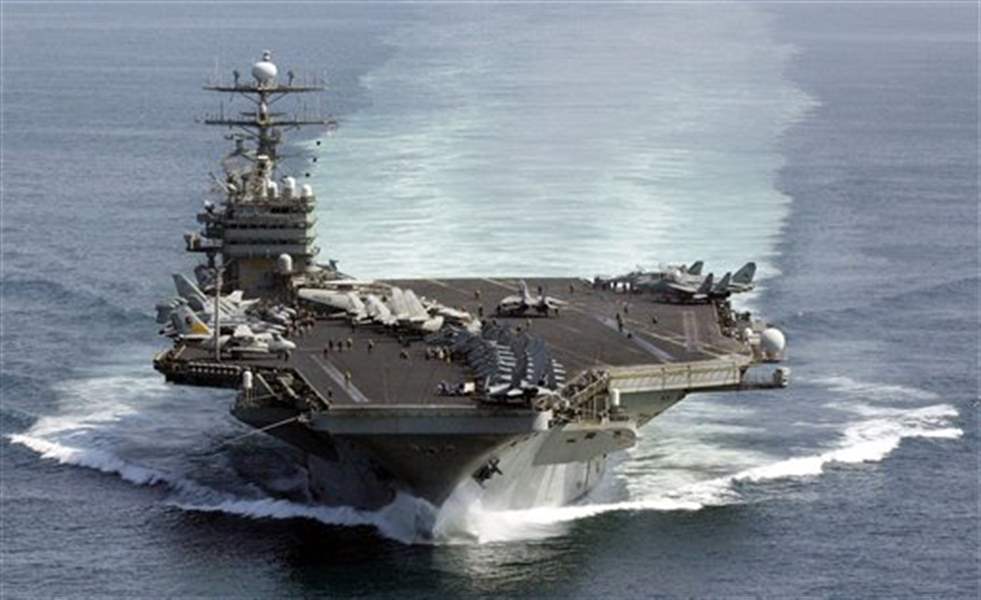
Massive aid effort begun for Haiti quake victims
1/14/2010
File photo shows the U.S. Navy aircraft carrier USS Carl Vinson patroling the Arabian Sea. The USS Carl Vinson is under way and expected to arrive off the coast of Haiti Thursday
DAVE MARTIN / AP
GENEVA — Sniffer dogs, high-energy biscuits and tons of emergency medical aid were heading to Haiti on Wednesday as governments and aid groups launched a massive relief effort for the estimated 3 million people reeling from a devastating earthquake.
Aid officials in the impoverished Caribbean nation worked to clear rubble from roads, build makeshift hospitals and remove bodies from the rubble despite transportation problems and broken phone lines.
Wintry weather in Europe added to the challenge, with snow temporarily delaying a British aid flight with 64 firefighters and rescue dogs at Gatwick airport.
As it struggled to gauge the full scale of the catastrophe, the United Nations said it was rushing food, personnel and medical supplies to alleviate the "major humanitarian emergency." It also confirmed at least 140 members of its own staff were missing under flattened roofs in the Haitian capital, Port-au-Prince.
"We'll be using whatever roads are passable to get aid to Port-au-Prince, and if possible we'll bring helicopters in," said Emilia Casella, a spokeswoman for the U.N. food agency. Its 200 staff in Haiti were trying to deliver high-energy biscuits and other supplies, despite looting and the threat of violence in a nation long plagued by lawlessness.

File photo shows the U.S. Navy aircraft carrier USS Carl Vinson patroling the Arabian Sea. The USS Carl Vinson is under way and expected to arrive off the coast of Haiti Thursday
Humanitarian officials said the proximity of the quake's epicenter, only 10 miles (15 kilometers) from Port-au-Prince's sprawling slums and hilltop villas, as well as Haiti's crumbling infrastructure, meant it was difficult to estimate how many people might be dead or injured.
But the sheer number of dead bodies was expected to pose a problem. The World Health Organization said it has sent specialists to help clear the city of corpses and prevent the spread of disease, and the Red Cross was sending a plane Thursday loaded mainly with body bags.
The Red Cross estimated that 3 million people will require aid, ranging from shelter to food and clean water, and said many Haitians could need relief for a full year.
"There are many, many people trapped in the rubble," said Paul Conneally, spokesman for the International Federation of Red Cross and Red Crescent societies. "We're not optimistic at the moment."
U.S. Secretary of State Hillary Rodham Clinton said the United States was offering full assistance — civilian and military.
Ships, helicopters, transport planes and a 2,000-member Marine unit are either on the way or likely to begin moving soon, U.S. officials said.
France dispatched 65 rubble-clearing specialists and six sniffer dogs for Haiti, while Spain was rushing three airplanes of rescuers and 100 tons of tents, blankets and cooking kits. Israel was sending in an elite army rescue unit of engineers and doctors. A military reconnaissance team from Canada was arriving in Haiti on Wednesday aboard a C-130 transport plane to assess the need for donated mosquito nets, basic household goods, tents and sanitation packages.
Dozens of other countries, including Britain, Germany, China, Mexico, Iceland and Venezuela, pledged rescue teams, doctors, cash and supplies.
The Red Cross said Haiti's own disaster relief teams were "completely overwhelmed."
"There's no structured response at this point," spokesman Simon Schorno told The Associated Press.
The early airlifts to Haiti will concentrate on search and rescue efforts, setting up makeshift hospitals and delivering food.
The Irish telecommunications company Digicel said it would donate $5 million to aid agencies and help repair Haiti's damaged phone network — essential for aid workers to coordinate their efforts.
Doctors Without Borders said it had already treated over 300 people in tents near where its Martissant health center was damaged. The injuries include broken bones and some severe burns from domestic gas containers that exploded in collapsed buildings. It said hundreds more Haitians were being treated in tents elsewhere.
U.N. humanitarian spokeswoman Elisabeth Byrs said the neighboring Haitian cities of Carrefour and Jacmel also were heavily damaged. There is no electricity in Port-au-Prince, Byrs said, adding that the airport was open but not connected by a serviceable road to the city.
Charles Vincent, a senior World Food Program official, said the U.N. already had 15,000 tons of aid in Port-au-Prince. It hoped to airlift 86 tons of high-energy biscuits from El Salvador, enough to feed 30,000 people for a week, but will reroute the shipment through the neighboring Dominican Republic if aid cannot travel over the airport road to the Haitian capital.
Casella said U.N. peacekeepers and aid workers in Haiti would try to fill in holes and build temporary bridges to make key roads passable.
In the first 48 hours, clean water will be more important than food, aid officials said.
Veronique Taveau, spokeswoman for the U.N. children's fund, said unless rescuers manage to provide sufficient supplies of uncontaminated water soon, survivors risk "all the diseases you can imagine."